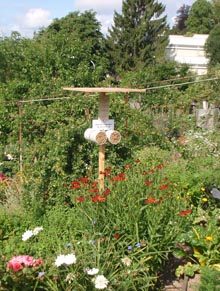Bee diversity in Zurich family-gardens
Table of contents
The Project
Urbanization has been increasingly transforming natural areas in city landscapes dominated by manmade infrastructure. Family gardens (rentable satellite gardens) are one component of this urban landscape in the city of Zurich that could act as essential habitat to species of solitary-nesting Hymenoptera that still remain within the city, however, many of these gardens have been facing increased pressure to be closed and developed. As the ecosystem services of pollination and pest control that these Hymenoptera provide are extremely valuable to humans, two students in the Plant Community Ecology group at the IEU have dedicated their Masters work to investigating how the properties of these gardens and their surrounding area affect the structures of the communities of these Hymenoptera as well as the other species within their ecosystem with which they are interconnected.
January 2011 - January 2012
Sarah Pellkofer completed her project in January 2012. In the summer of 2011, she set up trap nests in 32 family gardens around the city of Zurich and looked specifically at what features of these gardens on the local and landscape scale make them more suitable as such a habitat. Specifically she analyzed how local management practices predicted the presence of these species, as compared to landscape-level characteristics, such as garden size and the urbanness of the garden’s surroundings. Her work was completed in collaboration with the group in Spatial Ecology and Remote Sensing Group, University of Zürich. Sarah found that these gardens are in fact an important habitat for Hymenoptera as she found a great number of individuals and a wide variety of genera utilizing all varieties of gardens analyzed. A full copy of her thesis is available here:
January - December 2012
Currently, Katie Horgan is further analyzing the data that Sarah collected to see how the structure of the interactions, or food webs, between the analyzed species differ across the targeted gardens. Katie’s work looks at how healthy these insect communities are and whether foodwebs with more species and more interactions are more resilient to disturbance and parasitism. In highly disturbed habitats, such as gardens and particularly gardens in an urban environment, Hymenoptera populations become vulnerable. Low numbers of solitary bees and wasps leads to a resulting loss of the valuable pollination services they provide. The work of both Sarah and Katie is intended to add to the understanding of how existing gardens should be managed to maximize Hymenoptera populations and their connected community biodiversity.
Participants
Katie Horgan (M.Sc.)
Sarah Pellkofer (M.Sc.)
Dr. Lindsay Turnbull
Dr. Gabriela Schaepmann-Strub
Dr. Owen Petchey
